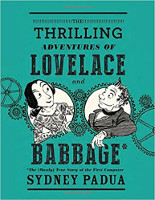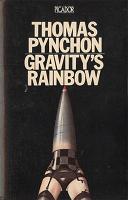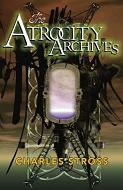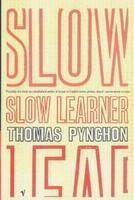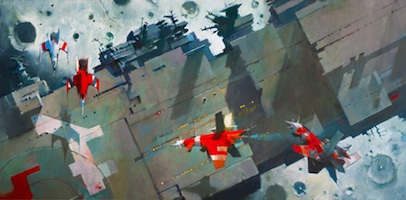 I generally hold it with the wisdom of Public Enemy: Don't Believe The Hype. So, when something (in this case a book) comes along which is the bestestest thing ever, the greatest invention since the Triangular Wheel (Once bump less per rotation!), and something I absolutely urgently totally Must Read Now – I politely decline. Because it's a turn-off, because it's all too frequently not true, because I've been disappointed a few too many times, and because tomorrow there will be a different latest greatest hottest never to be surpassed thing anyway.
I generally hold it with the wisdom of Public Enemy: Don't Believe The Hype. So, when something (in this case a book) comes along which is the bestestest thing ever, the greatest invention since the Triangular Wheel (Once bump less per rotation!), and something I absolutely urgently totally Must Read Now – I politely decline. Because it's a turn-off, because it's all too frequently not true, because I've been disappointed a few too many times, and because tomorrow there will be a different latest greatest hottest never to be surpassed thing anyway.
So, when Ann Leckie's debut novel Ancillary Justice burst on the scene, winning heaps or praise and about every award going (and, from the noise you'd think also some yet to be invented), I watched all the frothing going on, and read something else.
Still, the book was presented to me, with quieter, more insistent recommendations, so I relented and read it. Here is what I found.
Ancillary Justice is the first book in a 'loosely connected' trilogy known as Imperial Radch. The 2nd book in the series, Ancillary Sword, came out in in 2014, is on this year's Hugo shortlist (and likely to win, due to Puppygate); and the final instalment (Ancillary Mercy) is scheduled for release in 2015. Ancillary Justice has won the BSFA, Hugo, Nebula, and Clarke Awards (I think there's more, but that's the main ones anyway).
The titles in themselves make interesting and subtle points – within the Radch Imperium (a rather large portion of space, centrally controlled) the names Justice, Sword, and Mercy refer to military space ships – a Justice is a troop carrier, the other two are smaller battle ships. An Ancillary, though, is a member of the crew of a Justice, a soldier, normally taken prisoner during an Annexation (ie the Radch gobbling up another planet or solar system), who in most cases is put in storage for a few hundred years, and who, when resurrected and ambulatory, has none of his previous memories or personality anymore, but is controlled by the ship mind of the Justice, who functions as some kind of hive mind, with many pairs of eyes, hands, voices.
The story is told in two strands – one follows an individual calling herself Breq from the Gerentate, on some 19+year mission for – Revenge? Justice? , and getting to a key point in that quest. Breq keeps musing on being alone, on only having one pair of eyes, on all that she's lost. And now she has found someone she has known a very long time ago – half dead, dying in the snow on some god-forsaken planet, outside Raadch space... what are chances?
The other strand shows us history, the memories of a ship (the Justice of Toren) during the aftermath of the final Annexation; memories of the actions of its One Esk Cohort who were securing part of the planet, of the associated Decade Lieutenant, and of some political insider games being played which we learn have an even grander and more important background than anybody suspected – and it all seems to centre on Anaander Minaai, the Lord of the Radch, who seems to be pulling strings behind the scenes - for reasons the protagonist is aware of, but doesn't share (at least with the reader) for a good part of the book. Fair enough, I guess...
Breq clearly is not human, but some kind of Ancillary, or separated part of of a group mind. We hear her reflect on what the right facial expression would be for an specific occasion, and then make it (this hugely reminded me of Peter Watt's Siri Keeton from Blindsight): “nineteen years pretending to be human hadn't taught me as much as I'd thought”. She stresses that she is made by the Raadchai, but is is not Raadchai herself, which is quite telling; contrast that to Banks' Culture, where all and sundry were made citizens. I generally can see where the Banks comparisons come from, with the huge empire, the ships and ship minds etc, but that's where the comparison ends in my opinion – the writing and storytelling is very different, and so is the actual setting.
Of course, the main thing everybody seems to be mentioning about the book is the gender language, or rather the lack thereof. It's not as consequent as it's frequently presented, though... but: the Raadchai language is gender agnostic (their society itself displays no gender relevance). We see how Raadchai struggle with other societies, and with their gendered language (so yes, there is quite some gendered language and concepts in the book). But - for the translation into/representation in English of the parts told in Raadchai, Leckie used all female pronouns. Now, this can be intriguing and keep you on your toes; this can feel weird, and forced, and it can leave you distracted at times when you wonder what someone is, which can be distracting. This is, of course, not an entirely new trick to put it mildly, and felt like a bit of a gimmick (although I know that Leckie considers it central to her Raadchai culture - I take her word on that). And it left me wondering if the hype about this would have had the same shading should she have decided to use male pronouns instead?
There are other things about the Raadchai which are equally weird and fascinating - they have a weird thing/taboo about gloves/naked hands, and about jewelry. Their class system is clearly alive and kicking, there is ever so much snobbery which is being reported, verbatim. Old houses vs new/provincial ones. Old citizens vs new ones from Annexiations, vs non-citizens. Some of it (including some of the military bits)are clearly modelled on the Roman Empire, but this is much more than 'Romans in Space'.
There are also some parts of the book which feel over-demonstrated or explained, and others where I felt that some of the changes in the protagonists, or their actions, did not really have a believable explanation in anything the story told, but these are minor quibbles.
Still, firstly – this is a great debut novel indeed
Secondly – yes, I will read the sequels
And thirdly: Don't believe the hype. But read this book!
More Ann Leckie
Title: Ancillary Justice
Author: Ann Leckie
Series: Imperial Radch
Series Number: 1/3
Reviewer: Markus
Reviewer URL: http://thierstein.net
Publisher: Orbit
Publisher URL: http://www.orbitbooks.co.uk
Publication Date: 2013
Review Date: 150404
ISBN: 9780336502403
Price: UKP 7.99
Pages: 386
Format: PB
Topic: SF
Topic: Space Opera
